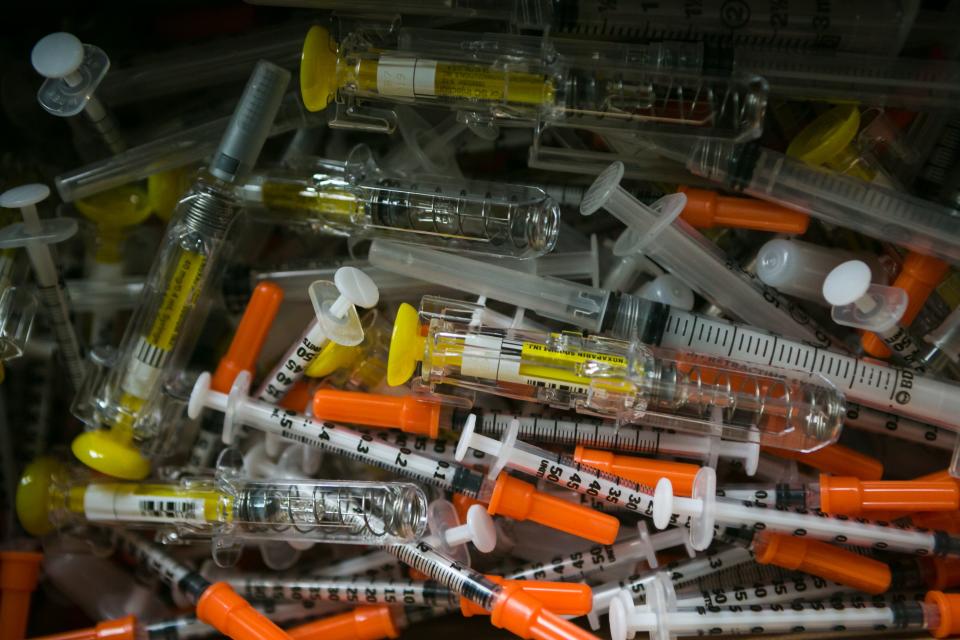How Delaware aims to strengthen women's reproductive rights with these bills
The Delaware Senate will weigh a series of bills aimed at protecting fertility treatment, abortion access and overall reproductive rights in the First State as the legislative body enters its final month of session.
House Bill 374, sponsored by House Rep. Kendra Johnson and Rep. Nicole Poore, will codify legal protections for fertility treatment providers, protecting Delawareans’ access to in-vitro fertilization and other assisted reproductive technologies.
The bill passed the state House of Representatives in late-May along party lines, and now goes to the Delaware Senate for consideration.
After the U.S. Supreme Court overturned Roe v. Wade in 2022, which protected a person’s right to abortion, more than a dozen states passed or attempted to pass fetal personhood bills.

The personhood bills give fetuses, and in some cases embryos, the legal rights of a person, making fertility treatments like IVF inaccessible or even illegal with threats of legal action against medical professionals should they provide such treatment.
These efforts prompted Delaware lawmakers to draft legislation protecting IVF treatment.
“Without access to IVF, my two beautiful children would not be here today, so I know firsthand the immeasurable joy that these treatments bring to those who dream of starting or growing their families,” Johnson said in a news release following House Bill 374’s passage. “The very personal decision to begin fertility treatments belongs in the hands of families and their doctors, not the government. This legislation will ensure that providers and hopeful parents are not punished simply for seeking to fulfill their dreams of parenthood.”
Two other bills, sponsored by Sen. Kyle Evans Gay and recently moved out of committee for consideration on the Senate floor, address transparency regarding services and medical professionals at “crisis pregnancy centers” and would require public universities to provide access to abortion pills.
These are the bills to watch in the remaining weeks of legislative session that aim to protect and expand reproductive rights and health care access:
Protecting access to IVF
The bill, which passed the House on May 21, was assigned to the Senate Judiciary Committee for consideration.
LEGISLATION BACKGROUND: With reproductive health care in jeopardy, Delaware looks to protect fertility services
The legislation does the following:
Prohibits health care providers from disclosing communications and records concerning fertility services without the patient’s consent in “any civil action or proceeding, with some exceptions.”
Allows people who are sued in another state for “allegedly receiving or providing fertility treatment services that are legal in Delaware” to recover costs, damages, or attorney fees.
Clarifies that medical professionals who “perform, recommend, or provide legal fertility treatment” in Delaware aren’t subject to other states’ provider regulations.
Prohibits insurance companies from increasing premiums or taking “adverse actions” against providers and organizations that provide legal fertility treatment and services.
Transparency on ‘pregnancy center’ operations
Senate Bill 300 would require “crisis pregnancy centers” to provide notice if the center is not licensed by Delaware “as a medical facility and does not have a licensed medical provider who provides or directly supervises, in person, the provision of services.”
The legislation designates these centers as “limited medical facility services.”
Operators of the pregnancy centers have come out in opposition to the legislation, arguing that it’s a “clear attack” on the centers that “singles them out and seeks to silence” their voices. Some center operators claimed that the bill is “unconstitutional.”
MATERNAL MENTAL HEALTH: Mental illness is the leading cause of pregnancy-related deaths. What's being done
Gay, who is the Senate sponsor on the bill, said the goal of the legislation is to manage the “misinformation” that may come out of the pregnancy centers, which offer pregnancy tests, confirmation ultrasounds and prenatal referrals but are not licensed by the state as medical providers and may not have a licensed medical provider on site providing these services.
“There are numerous studies nationwide that demonstrate that so-called pregnancy centers are using deceptive measures,” Gay said. “They are sharing debunked misinformation.”
Indeed, the discussion among Delaware senators on the bill in committee included misinformation about New York’s abortion laws suggesting that they allow for abortion “up to birth,” which is incorrect.
Abortion access at public universities
Senate Bill 301, also sponsored by Gay, aims to require Delaware’s public universities to provide access to medication for termination of pregnancy and emergency contraception.
While both Delaware State University and the University of Delaware provide access to birth control and emergency contraception, commonly known as Plan B, it does not offer abortion pills.

Gay said that through discussions with providers and the universities, a revised draft of the legislation is being worked on that will address concerns schools had around standards of care, liability and others.
“We’re looking to enhance the bill so they can work with partners and not just send someone somewhere, but being part of that continuum of care,” she said. We want to “remove the barriers to care for this population of young people.”
ABORTION ACCESS: Delaware college campuses navigate questions about abortion in wake of Roe v. Wade
Gay pointed out that college students may be far away from home, with little to no access to transportation, necessitating a need for access to abortion pills or emergency contraception on campus. A large percentage of people who seek abortions or emergency contraception are college-aged, she added.
“We have to realize that just because we pass a law that says you have a right to something, doesn’t mean it is accessible to everyone in our state,” Gay said.
Got a tip? Contact Amanda Fries at [email protected]. Follow her on X at @mandy_fries.
This article originally appeared on Delaware News Journal: These bills aim to strengthen women's reproductive rights in Delaware
